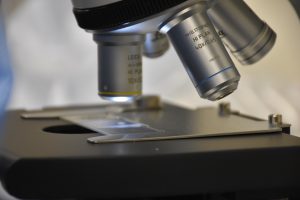What is Clinical Laboratory Science?
Clinical Laboratory Science, also called Medical Laboratory Science or Medical Technology, is the health profession that provides laboratory information and services needed for the diagnosis and treatment of disease. Clinical Laboratory Scientists perform a variety of laboratory tests, ensure the quality of the test results, explain the significance of laboratory tests, evaluate new methods and study the effectiveness of laboratory tests. Examples of laboratory tests performed by Clinical Laboratory Scientists include:

- the detection of the abnormal cells that cause leukemia
- the analysis of cardiac enzyme activity released during a heart attack
- the identification of the type of bacteria causing an infection
- the detection of DNA markers for genetic diseases
Molecular Diagnostic Science is a specialized area of Clinical Laboratory Science that uses sensitive and specific techniques to detect and identify biomarkers at the most basic level: that of nucleic acids (DNA and RNA). Common applications of molecular methods include medical diagnosis, establishing prognosis, monitoring the course of disease, and selecting optimal therapies. Molecular methods are also used in both forensic and non-forensic identification. A variety of biological materials can be used for molecular testing including fetal cells from amniotic fluid, dried blood spots from newborn screening programs, blood samples, buccal (mouth) swabs, bone, and hair follicles.
Molecular diagnostic tests are increasingly used in many major areas of medicine including genetic disorders, infectious diseases, cancer, pharmacogenetics and identity testing. Examples include:
- Genetic disorders: Molecular methods are used to detect common inherited diseases such as cystic fibrosis, hemochromatosis, and fragile X syndrome.
- Infectious diseases: Many diseases – including hepatitis, tuberculosis, human immunodeficiency virus (HIV), human papilloma virus (HPV), Chlamydia, Neisseria gonorrhoeae, and methicillin-resistant Staphylococcus aureus (MRSA) – can be identified faster and more accurately using molecular techniques as compared to traditional culture or antibody assays.
- Cancer: Some leukemias and solid tumor cancers can be detected and identified by molecular probes which target the abnormal gene rearrangements occurring in these disorders.
- Pharmacogenetics. Molecular testing can be used to individualize a specific dosing schedule for patients on a common blood thinner, warfarin, and thereby reduce the likelihood of overmedication and potential bleeding problems.
- Identity testing: Molecular diagnostic tests are used in determining the identity of combat casualties, in analyzing crime scene evidence, in determining paternity, and identifying foreign DNA in transplantation medicine.
These examples are only a small sample of the many clinical and other applications of molecular testing methods.
Vignettes of the Profession of Clinical Laboratory Science [pdf file] by Barbara Thornton, CLS(NCA), MT(ASCP), M.Ed.